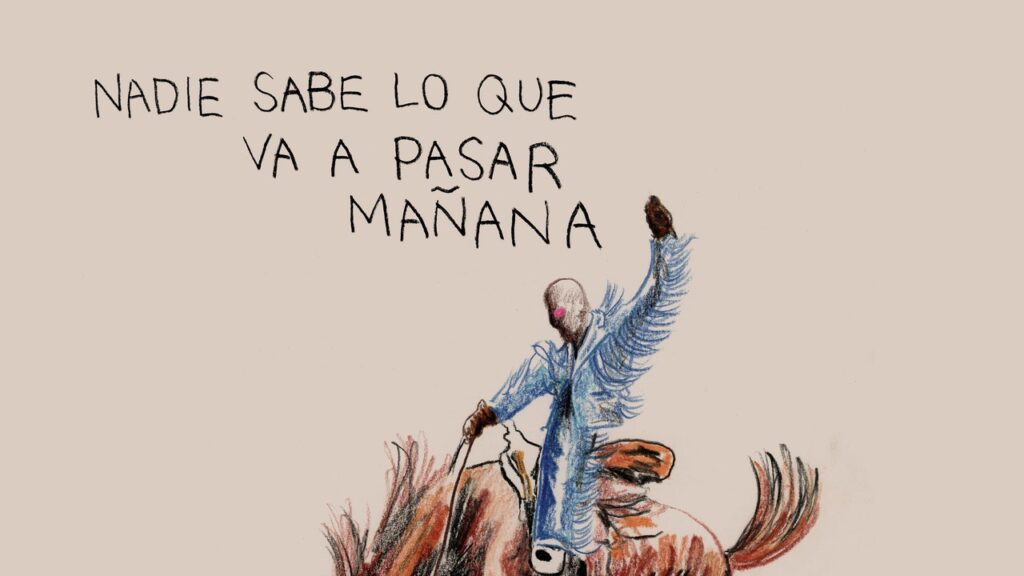
Once upon a time, Bad Bunny was the king of a movement called Latin trap. Seven years ago, before the Rolling Stone covers and the Gucci ads with Kendall Jenner, Benito Antonio Martínez Ocasio was an audacious newcomer with labyrinthine graphics on his scalp and a closet full of neon short-shorts. When his 2022 album Un Verano Sin Ti—a pop masterwork immersed in Caribbean humidity and dreamy glitz—arrived, it catapulted him into the public eye like never before. If you weren’t already following Benito’s journey, UVST’s gushing sentimentality and commercial polish made it seem like the Puerto Rican artist had always been the kind of pop star who sells out stadiums. But acolytes know that Benito has long been an elite rapper—even if he’s sometimes sidelined that skill on his jaunt to the top.
Nadie sabe lo que va a pasar mañana, Bad Bunny’s fifth solo studio LP, functions like a rap homecoming. The album is bloated but thematically focused, centered on some of Benito’s favorite topics: fucking, counting racks, his love of Puerto Rico. As he embraces the insouciant recklessness and unabashed horniness that enamored the globe, some might rejoice that El Conejo Malo has returned to his roots. Though he’s preternaturally funny and frequently debonair, only a portion of these songs approach the vim and vigor of his generation-defining anthems.
Nadie sabe comes to life when Benito is intentionally provocative or artfully humorous. His smutty wisecracks produce laugh-out-loud gems: On the salacious “Baticano,” he invokes Teletubby characters in a rhyme about putting his pinky in a woman’s ass and making love to her where she “pees” and “poops.” On “Fina,” he brags about his dick being bald and big-headed, like the four-year-old cartoon character Caillou. “Thunder y Lightning” is a gritty drill howl, with Benito and guest Eladio Carrión going bar for bar as they stunt through deep-cut Puerto Rican sports references. When the song ends, Benito takes a jab at former creative partner J Balvin for being too infatuated with success, noting that he’s “friends with everybody.”
The antics are entertaining, and embody the cavalier goofiness that has set Bad Bunny apart in an industry full of high-gloss acts with little to say. But many songs lack the sophistication and structural complexity of his trap epics. Opener “Nadie Sabe” is a Drake-adjacent lament on celebrity insecurity, while “Hibiki,” “Gracias Por Nada,” and “Baby Nueva” are marred by unimaginative flexing and empty kiss-offs. Benito usually does everything with a peerless sense of panache and individuality—and a thoughtful eye for the issues affecting his homeland—so it feels uncharacteristic for him to be preoccupied with such prosaic concerns. Even Benito himself seems to recognize this: On the highlight “Los Pits,” which recalls Jay-Z’s realization in “Moment of Clarity,” he claims that he could be “rapping about more profound issues, but the checks arrive and confuse me.”
There are sublime exceptions. “Monaco” and “Vou 787” construct a fantasia of luxury—a life filled with Cuban cigars, million-dollar Bugattis, and diamond-encrusted glassware. Sumptuous samples augment the aura of opulence: MAG and La Paciencia loop the romantic strings of Charles Aznavour’s “Hier Encore” on “Monaco,” while “Vou 787” lifts the silken synth line that opens Madonna’s “Vogue.” The production is consistently impressive, as on “Teléfono Nuevo,” which begins with the type of moonstruck, synth-driven glimmer that reflects Benito’s gift for amplifying wistful emotion into small moments of triumph. When a disconnect tone cuts off the beat, it’s like your brain just dropped the call. Halfway through the first verse of the macabre standout “Vuelve Candy B,” he hushes his voice, delivering the rest of his bars in a susurrous, theatrical flurry. It’s an exciting flow switch that reprises Benito’s indelible magnetism.
At 22 tracks and 81 minutes, nadie sabe is the type of overlong streaming-era album that could use a meticulous edit to help its treasures sparkle. Too frequently, it feels like a regression from the star-making highs of Bad Bunny’s rap past. Consider 2016’s “Tu No Vive Así,” where Benito nimbly folded in obscure references to Taíno chieftains and catechism courses. Or return to 2020’s “Booker T,” in which he growled through his teeth, flipped a children’s folk song into a boast, and paused dramatically to sip water and catch his breath. Both of these songs avoided inane stunting, instead cultivating Bad Bunny’s mythos through inventive and unexpected flourishes. And while the man has built a reputation for making party and political anthems alike, it’s not that nadie sabe would be better if it were more explicitly radical; those kinds of expectations place unrealistic demands on pop stars and usually lead to disappointment. Bad Bunny can rap about sex and money all he wants, but he’s capable of doing so with much more intricacy and magic. To use Benito’s own words, you can’t just say you’re the best. You also have to prove it.
